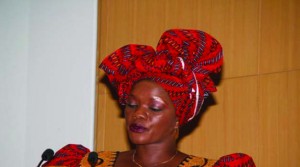By PERPETUAL SICHIKWENKWE –
THE Lusaka High Court has thrown out a matter in which former Tourism minister Sylvia Masebo challenged the decision by the Director of Public Prosecutions (DPP) to prosecute her for abuse of authority in the Lusaka Magistrates Court.
Judge Petronella Ngulube said in her ruling yesterday that the DPP has powers to undertake criminal proceedings against any person before any court in respect of any case alleged to have been committed.
Masebo had applied against the acting DPP, Lillian Siyunyi’s decision to prosecute her on two counts of abuse of authority in relation to the Zambia Wild Life Authority (ZAWA) saga.
She wanted the High Court to quash Ms Siyunyi’s decision and declare that her arrest and criminal prosecution was an abuse of the court process.
Masebo further wanted the court to stop the acting DPP from prosecuting her on charges arising from matters that were dealt with by the Roydah Kaoma-led tribunal appointed to probe her conduct under the Parliamentary and Ministerial Code of Conduct Act.
But Ms Justice Ngulube said Masebo had failed to prove that the decision of the DPP to prosecute her had contravened or exceeded the terms of the law.
“I therefore decline to grant the applicant leave to apply for judicial review for the aforementioned reasons. This application therefore fails and is dismissed,” she said.
In a different matter, Ms Masebo asked the Lusaka Magistrates Court to refer to the High Court a case in which she is charged with unauthorised procession and escaping from lawful custody.
Masebo and four others told magistrate Lameck Mwale that the charge of unauthorised procession which they were facing was an infringement on their right to freedom of movement.
When the matter came up for commencement of trial yesterday, Masebo through her lawyer Robert Simenza informed the court that she had issues to raise concerning her trial.
Mr Simenza said the indictment indicated that her clients were charged with unauthorised procession under the Public Order Act, which was unconstitutional as it contravened Article 22 of the Constitution.







